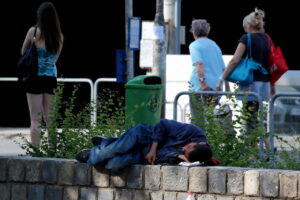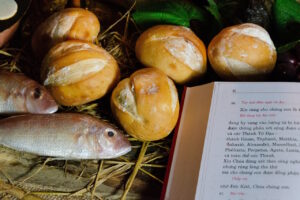Jeremiah 31: 31-34 (RM) or 1-12 (RCL); Psalm 51; Hebrews 5: 7-9 (RM) or 5-10 (RCL); John 12: 20-33.
If you happen to live in the Northern Hemisphere, it’s the perfect analogy for this time of year – seeds. Seed packets are on full display in the stores. My public library has a fully stocked “seed library” ready for local gardeners. Depending on where you live, the perennials are already popping up and unfolding their beauty. My snowdrops were out two weeks ago, the daffodils and tulips are pushing up their leaves, and the hyacinths I planted in an arc around the grave of my beloved cat are just peeping above ground.
Nestled within our Gospel reading for this Sunday, rather like a half-hidden seed among mounds of moist ground, is the line:
“Truly I say to you, unless a grain of wheat falls to the ground and dies, it remains just a grain of wheat; but if it dies, it produces much fruit.”
In context, this analogy intensifies our awareness of the impending death of Jesus together with a promise of new life only made possible by passage through death. We are on the approach to Holy Week, a time of horror relived each year by each new generation of Christians. Here the Christmas joy of God-become-human in the Incarnation, in our own fragile human flesh, comes to a terrifying dénouement. And here, as the writers of the Gospel of John remind us in the next line, it’s not only about him. It was about the danger of persecution faced by the first generations of Christians, the people these writers were addressing with words they placed in the mouth of Jesus. It mirrors a risk all Christ-like folks take in living out their faith courageously in all its possible consequences.
But notice one thing. The grain of wheat doesn’t actually die. If it did, nothing would grow. In the grain of planted wheat, life is changed, not ended, to quote the funeral rite. Its life expands, extends upward, drinks in water and minerals, breathes fresh air and bathes in sunlight, unfolds new leaves, and then unfurls the new sheaves of wheat that expand its life ever outward, full of young grains of wheat that will land… in the soil. And start again the cycle of life.
Spiritual writer Ron Rolheiser points out that a flower
“…begins as a seed, then grows into a tiny bud that sprouts into a young plant. That bloom lasts for a while and then begins to dry out and wither. Eventually, what was once the substance of a beautiful bloom turns into seeds and then in its very act of dying, the flower gives off those seeds to leave new life behind.”
He goes on to cite the mystic John of the Cross:
“the deepest centre for a flower is not its moment of spectacular beauty, its bloom, but its last moment when its bloom has turned to seed and it is able to give off that seed in its very act of dying.”
But it’s not dead yet. It’s making new life possible in the process of dying. There’s a difference.
Embedded in this text is an exquisite analogy to the mystery of death and new life, situated in the fertility of this planet and the life-giving power of the cosmos. Cosmic theology, right here, a quick blip on the screen of an otherwise foreboding scripture text. Fear and hope, terror and joy, vital energy and deepening decline, mature age moving on into old age, mingled, intertwined, sometimes under our control, sometimes not.
In front of my picture window is a red geranium. A very tall geranium. Two years ago I set the pretty plant in a pot in front of the window, and it grew … and grew … up and up, with no frame for support, finally enfolding itself around the lampshade where it seems perfectly happy. I never knew a geranium could do that.
I think it’s trying to tell me something. And the snowdrops and the daffodils and the hyacinths outdoors are going to get in on the deal.
© Susan K. Roll
Credit goes to Jim Noonan of Corpus Canada for sharing this citation from Ron Rolheiser O.M.I.
This Reflection is adapted from that of March 21, 2021.
Susan Roll retired from the Faculty of Theology at Saint Paul University, Ottawa, in 2018, where she served as Director of the Sophia Research Centre. Her research and publications are centred in the fields of liturgy, sacraments, and feminist theology. She holds a Ph.D. from the Catholic University of Leuven (Louvain), Belgium, and has been involved with international academic societies in liturgy and theology, as well as university chaplaincy, Indigenous ministry and church reform projects.





The phrase you cite, that we commonly use at funerals, strikes me anew in your reflection: “life is changed, not ended”. A powerful statement of faith.